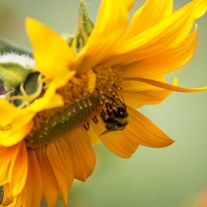
- Soil Association
- Take action
- Grow at home
- Why are bees in danger?

Why are bees in danger?
Why are bees in danger?
Bee numbers are falling across the world.
There isn’t one single cause to blame but there are three significant threats that stand out:
- pesticides,
- the varroa mite and
- habitat loss.
Find out more about these three threats below.
Pesticides
In non-organic farming, pesticides are often applied to crops to kill and control pests.
As a result, UK bees are exposed to whole range of pesticides. But a growing body of evidence is showing that pesticides can become even more harmful when combined. This is known as the cocktail effect. When looking into the cocktail effect, we found that mixtures of ten different chemicals were found in UK soil and water, with the potential to affect wildlife like birds and bees.
-
I want to stop pesticides killing our bees

Varroa mite
Honey bees also face another huge threat from the varroa mite. This attaches itself to the honey bee and sucks its blood.
When the bee returns to the hive, the varroa mite can spread and bring viruses and disease with them.
Varroa mites are unfortunately very successful. Once the varroa mite has entered a colony, it can kill the whole colony in 2-3 years. They have been found to be one of the main causes of colony collapse disorder in North America.
Habitat loss
There is also a significant threat against bees from our changing land use. As cities grow and agriculture becomes more intensive, bees are losing the wild spaces, hedgerows and meadows where they can find flowers and food.
An estimated 97 percent of wildflower meadows disappeared from England and Wales between the 1930s and 1980s. This has contributed to a profound impact on our wildlife, including bees. (Hayhow, D.B. et al (2016) ‘State of Nature 2016’, The State of Nature Partnership, p 21).
We have unfortunately lost many flowers from the landscape to growing cities, new roads and intensive agriculture. This has left the bees scrambling to find enough food. Many bee species have declined and two bumblebee species have even become extinct in the UK since 1940.
At Soil Association we campaign for more sustainable farming to support our bees and other pollinators for current and future generations. It’s important that farming protects space for the insects and wildlife that are part of the landscape too.
Help save our bees today

